Farm Confessional: I’m an Undocumented Farm Worker
In our new feature, Farm Confessional, we talk to agricultural workers whose stories often aren’t told. This week: a 40-year-old migrant farm worker based in Madera, California.
Farm Confessional: I’m an Undocumented Farm Worker
In our new feature, Farm Confessional, we talk to agricultural workers whose stories often aren’t told. This week: a 40-year-old migrant farm worker based in Madera, California.
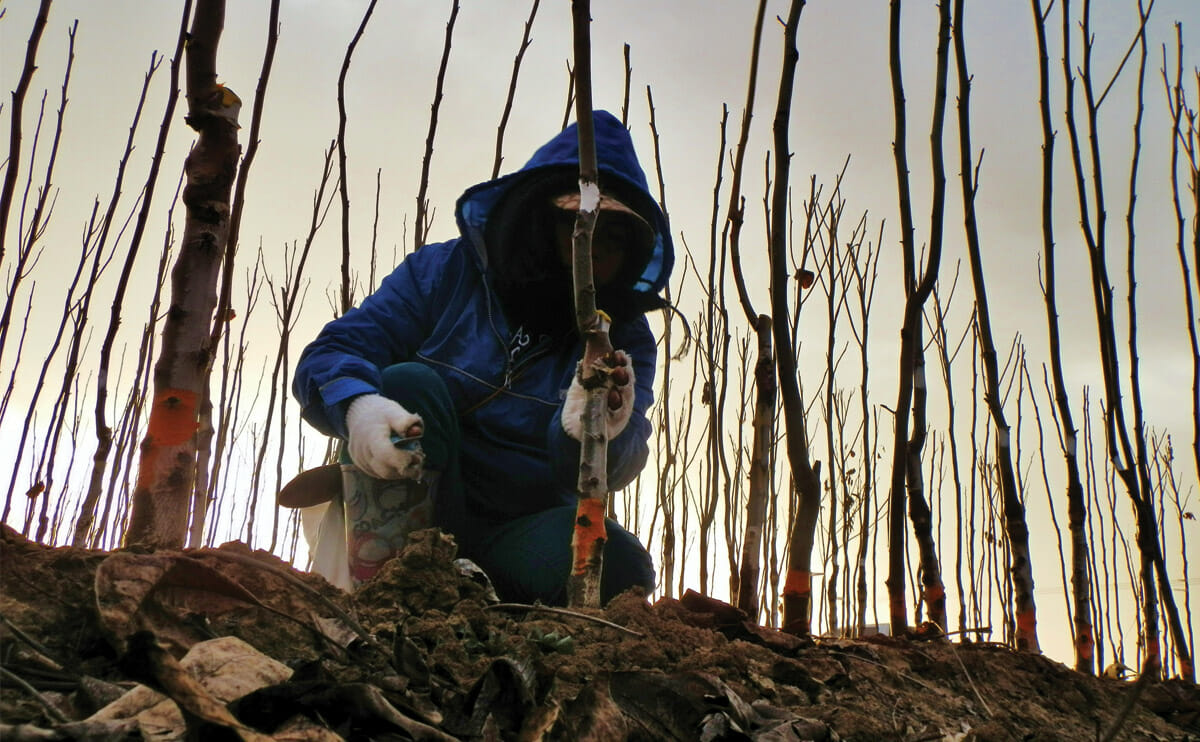
As told to and translated from Spanish by Lauren Smiley
I’m Odilia Chavez, a 40-year-old migrant farm worker based in Madera, California, the heart of the fertile Central Valley. I’m also a single mother of three: my 20-year-old eldest son came and joined me in 2004, crossing with a coyote. My son is now at the university, studying political science. The younger two were born here—American citizens.
I grew up in Santiago Yosondua, Oaxaca, in southern Mexico. I went to school through third grade, my dad was killed when I was 11, and we didn’t even have enough food to eat. So I went off to work at 12 in Mexico City as a live-in maid for a Spanish family. I’d go back each year to Oaxaca to visit my mom, and the migrants who’d come back from the United States would buy fancy cars and nice houses, while my mom still slept on a mat on the floor in our hut. A coyote told me he could take me to the United States for $1,800. So I went north in 1999, leaving my four-year-old son behind with my mother. I was 26.
I’ve seen on the news that some Congress members or American citizens say undocumented workers are taking their jobs. We’re not taking their jobs. In the 14 years I’ve been here, I’ve never seen an American working in the fields.
We crossed through the desert into Arizona, hiding from the border patrol. I finally arrived in Madera in March of 1999, and I moved into a boarding house for migrant farmworkers.
I’d never worked in a field. It was really hard at first—working outdoors with the heat, the daily routine. But I’ve certainly learned. In a typical year, I prune grapevines starting in April, and pick cherries around Madera in May. I travel to Oregon in June to pick strawberries, blueberries, and blackberries on a farm owned by Russians. I take my 14-year-old daughter and 8-year-old son with me while they’re on their summer break. They play with the other kids, and bring me water and food in the field. We’ll live in a boarding house with 25 rooms for some 100 people, and everyone lines up to use the bathrooms. My kids and I share a room for $270 a month.
I head back to Madera in August for my children to start school. We own our house now—paid off in April! I reached the American dream—ha—thanks to the help of the father of my youngest son, who died in 2007 after he returned to Mexico after a problem with immigration authorities and was killed while working as a policeman. In Madera, I pick grapes that will be made into raisins in September, usually rest in October. In November, I travel each day to Stanislaus County to work planting trees in a nursery until February.
On all the harvests, men and women work side-by-side doing the same job, and women work just as fast as the men. I’ve been harassed one time: when a boss who drove us out to the field every day wanted to hug me, and said he wouldn’t charge me the $8 a day for the ride if I’d go out with him. (Most of us don’t have driver’s licenses, so the contractors organize rides to work.) I left the job. In California, especially in Fresno and Madera counties, there’s an abundance of farm jobs. So you don’t have to do one you don’t like.
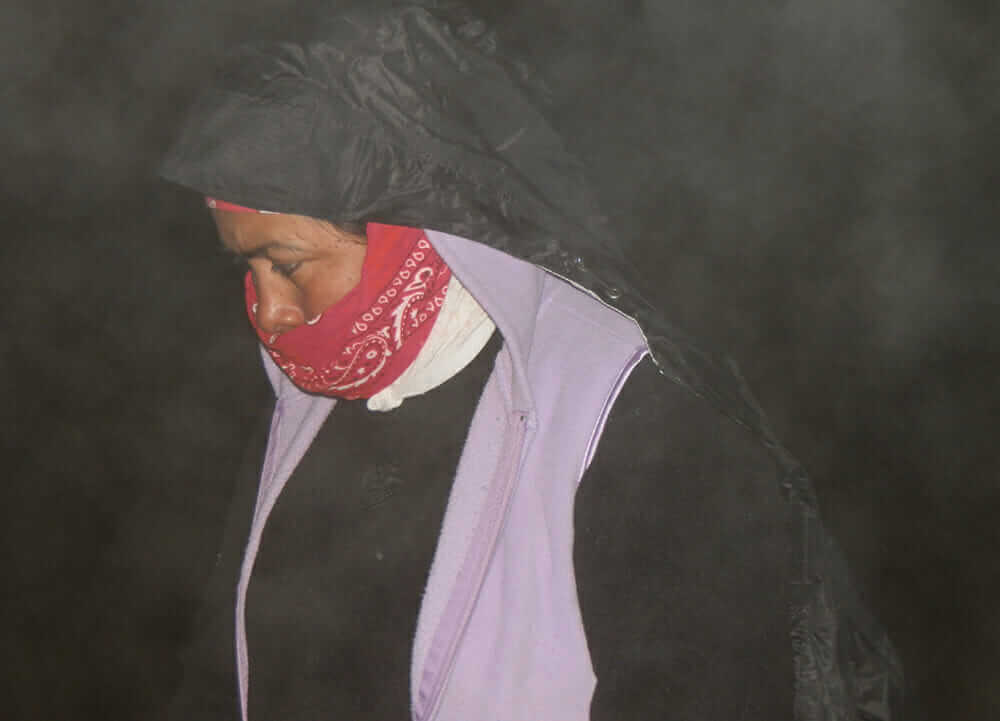
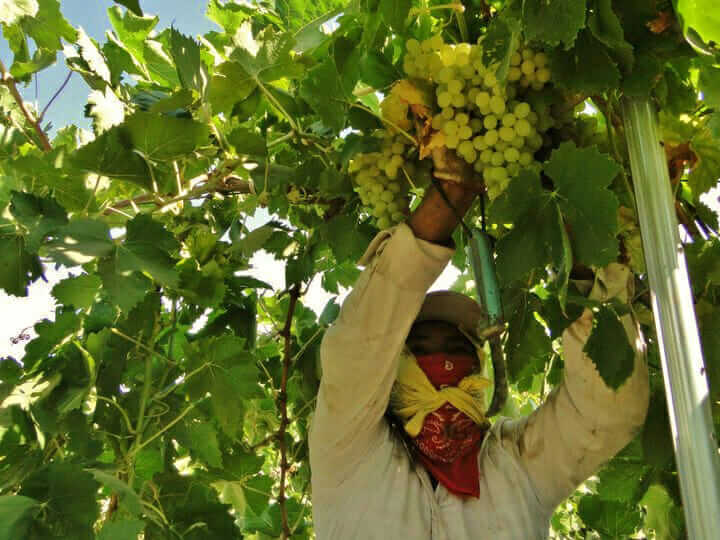
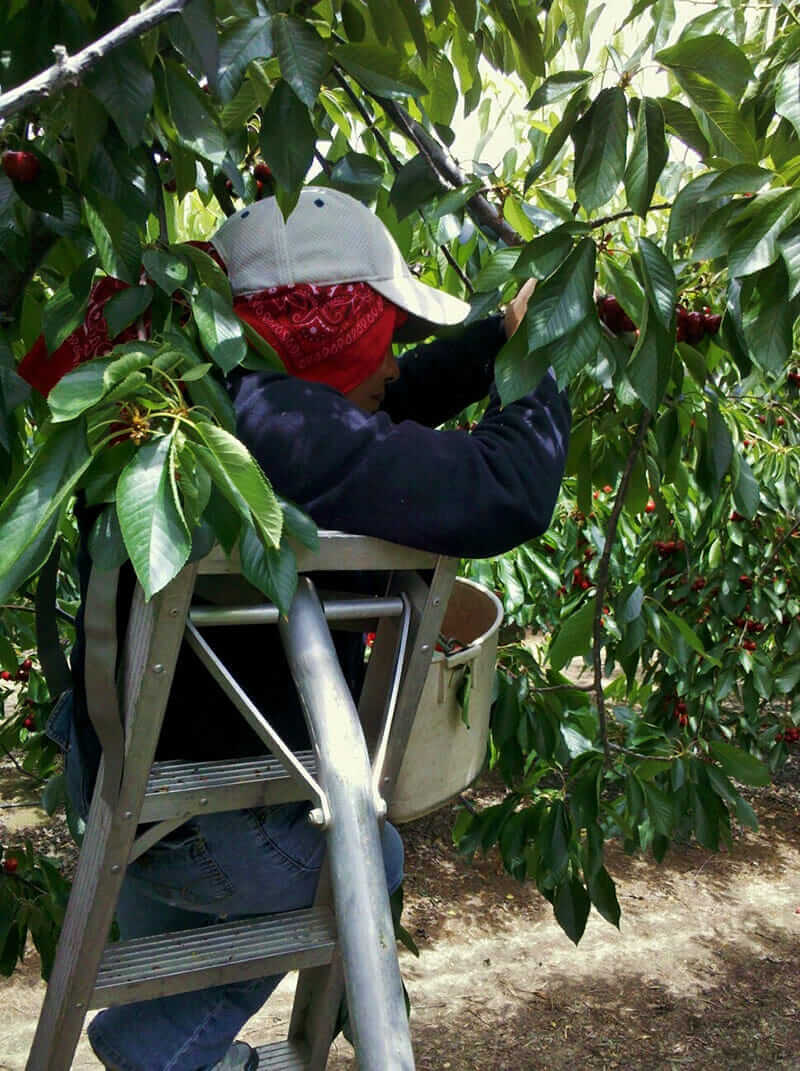
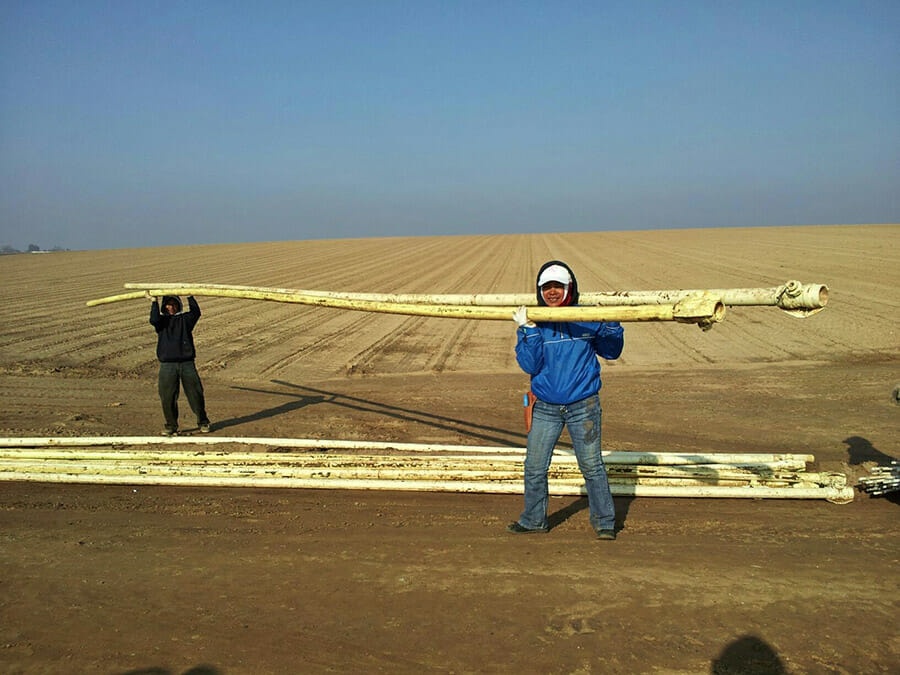
I’ve seen on the news that some Congress members or American citizens say undocumented workers are taking their jobs. We’re not taking their jobs. In the 14 years I’ve been here, I’ve never seen an American working in the fields. I’ve never seen anyone work like Mexicans. In restaurants and construction, you’ll find Salvadorans and Guatemalans, but in the fields, it’s almost all Mexicans.
The work is hard—but many jobs are hard. The thing that bothers me more is the low pay. With cherries, you earn $7 for each box, and I’ll fill 30 boxes in a day—about $210 a day. For blueberries, I’ll do 25 containers for up to $5 each one—$125 a day. With grapes, you make 30 cents for each carton, and I can do 400 cartons a day—$120 a day. Tomatoes are the worst paid: I’ll pick 100 for 62 cents a bucket, or about $62 a day. I don’t do tomatoes much anymore. It’s heavy work, you have to bend over, run to turn in your baskets, and your back hurts. I say I like tomatoes—in a salad. Ha. With a lot of the crops, the bosses keep track of your haul by giving you a card, and punching it every time you turn in a basket.
One time, a contractor who was an American citizen with Mexican parents called me a no-good illegal, and claimed he was going to call immigration on me. I said, “Send ’em over, I’ll be waiting!” I left that job.
I wish they would be more considerate of what we’re doing with the pay rate. They’re a little cheap: 31 cents for a carton of grapes. I would like another two or three cents a carton, because it’s really hard and heavy work. I’ve never worked a union contract job—a lot of them are in tomatoes or oranges—but if anyone doesn’t want to pay you, the United Farm Workers of America where I’m a volunteer, will help you get paid.
READ MORE
The High Cost of Cheap Labor
I’m very fast. In jobs where you’re doing delicate things, like pruning plants, they don’t want you rushing, so they pay you by the hour. But harvest jobs are usually paid by the quantity you pick. I prefer it that way—you have to run, but you can get home faster. We get there at 6:00 in the morning and, if I rush, I take a break at 1:00, drink and eat something, then work for another hour and head home. You pick the amount of hours you want to work, and you try not to take a lot of breaks so you can earn more. Some people will go until 5:00 in the afternoon and want to work and work, but I have my kids.
You come home really tired. I’ll come home, take a shower, put lotion on my hot feet, and be ready for the next day. I’m usually in bed by 9:00 to get up at 3:00 or 4:00 in the morning to make and pack some tacos for the day. Also, undocumented workers don’t have any medical insurance—so the majority of us just buy over-the-counter pills for any problems. Luckily, I haven’t had many health issues yet.
Some contractors think they can abuse you because you’re undocumented. One time, a contractor who was an American citizen with Mexican parents called me a no-good illegal, and claimed he was going to call immigration on me. I said, “Send ’em over, I’ll be waiting!” I left that job.
We all want immigration reform. First, I’d get a driver’s license, social security, and go see my mom in Mexico. (The last time I went was in 2008, and I had to cross the dessert again with a coyote to get back here—but it was the only option.) I would still work in the fields. I don’t know how to do anything else. A lot of workers haven’t gotten very far in school, and they can’t use a computer. What job are they going to do? We can’t get a better job. They were farmworkers in Mexico and we’re going to die as farmworkers. I do have a lot of pride in my work, though. It can be fun. We joke around.
I’m going to keep working as long as I can. My youngest son says he’s going to invent a robot to do the housework for me, and he’s going to earn a lot so we can buy our own ranch.
And yes, you can use my real name! Some undocumented people are scared, but I’ve never seen an immigration raid on a farm. (I hope they don’t start, either.) Agriculture is dependent on undocumented workers. We need the money from the farmers, and the farmers need our hands.
Follow us

This work is licensed under a Creative Commons Attribution-NoDerivatives 4.0 International License.
Want to republish a Modern Farmer story?
We are happy for Modern Farmer stories to be shared, and encourage you to republish our articles for your audience. When doing so, we ask that you follow these guidelines:
Please credit us and our writers
For the author byline, please use “Author Name, Modern Farmer.” At the top of our stories, if on the web, please include this text and link: “This story was originally published by Modern Farmer.”
Please make sure to include a link back to either our home page or the article URL.
At the bottom of the story, please include the following text:
“Modern Farmer is a nonprofit initiative dedicated to raising awareness and catalyzing action at the intersection of food, agriculture, and society. Read more at <link>Modern Farmer</link>.”
Use our widget
We’d like to be able to track our stories, so we ask that if you republish our content, you do so using our widget (located on the left hand side of the article). The HTML code has a built-in tracker that tells us the data and domain where the story was published, as well as view counts.
Check the image requirements
It’s your responsibility to confirm you're licensed to republish images in our articles. Some images, such as those from commercial providers, don't allow their images to be republished without permission or payment. Copyright terms are generally listed in the image caption and attribution. You are welcome to omit our images or substitute with your own. Charts and interactive graphics follow the same rules.
Don’t change too much. Or, ask us first.
Articles must be republished in their entirety. It’s okay to change references to time (“today” to “yesterday”) or location (“Iowa City, IA” to “here”). But please keep everything else the same.
If you feel strongly that a more material edit needs to be made, get in touch with us at [email protected]. We’re happy to discuss it with the original author, but we must have prior approval for changes before publication.
Special cases
Extracts. You may run the first few lines or paragraphs of the article and then say: “Read the full article at Modern Farmer” with a link back to the original article.
Quotes. You may quote authors provided you include a link back to the article URL.
Translations. These require writer approval. To inquire about translation of a Modern Farmer article, contact us at [email protected]
Signed consent / copyright release forms. These are not required, provided you are following these guidelines.
Print. Articles can be republished in print under these same rules, with the exception that you do not need to include the links.
Tag us
When sharing the story on social media, please tag us using the following: - Twitter (@ModFarm) - Facebook (@ModernFarmerMedia) - Instagram (@modfarm)
Use our content respectfully
Modern Farmer is a nonprofit and as such we share our content for free and in good faith in order to reach new audiences. Respectfully,
No selling ads against our stories. It’s okay to put our stories on pages with ads.
Don’t republish our material wholesale, or automatically; you need to select stories to be republished individually.
You have no rights to sell, license, syndicate, or otherwise represent yourself as the authorized owner of our material to any third parties. This means that you cannot actively publish or submit our work for syndication to third party platforms or apps like Apple News or Google News. We understand that publishers cannot fully control when certain third parties automatically summarize or crawl content from publishers’ own sites.
Keep in touch
We want to hear from you if you love Modern Farmer content, have a collaboration idea, or anything else to share. As a nonprofit outlet, we work in service of our community and are always open to comments, feedback, and ideas. Contact us at [email protected].by Lauren Smiley, Modern Farmer
November 6, 2013
Modern Farmer Weekly
Solutions Hub
Innovations, ideas and inspiration. Actionable solutions for a resilient food system.
ExploreExplore other topics
Share With Us
We want to hear from Modern Farmer readers who have thoughtful commentary, actionable solutions, or helpful ideas to share.
SubmitNecessary cookies are absolutely essential for the website to function properly. This category only includes cookies that ensures basic functionalities and security features of the website. These cookies do not store any personal information.
Any cookies that may not be particularly necessary for the website to function and are used specifically to collect user personal data via analytics, ads, other embedded contents are termed as non-necessary cookies.
Thank you so much for sharing this view of American agriculture. My husband is also from Yosondua (Yerba Santa), which is a very small town. He came to the US to work in agriculture for 8 years. We now live in Japan, our way of avoiding the painful issues of immigration in the US, in spite of my US citizenship. We send Odilia and her family our best wishes.
Modern Farmer you should be ashamed for publishing this article. I’m an US citizen, born & bred, and PhD Economist Dr Thomas Sowell has said how Illegal Immigration is driving down American wages (and don’t say he’s racist, cuz he’s African American) One of the things that you should mention that even those of us that don’t live in Cali know,is that the US Immigration system allows LEGAL Foreign Migrant Workers to come and TEMPORARILY work in the Agricultural Sector. What jobs the GREEDY Globalist Corporations can’t outsource to other Countries, they will fill through ILLEGAL IMMIGRATION so as to… Read more »